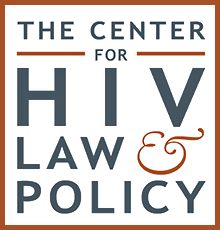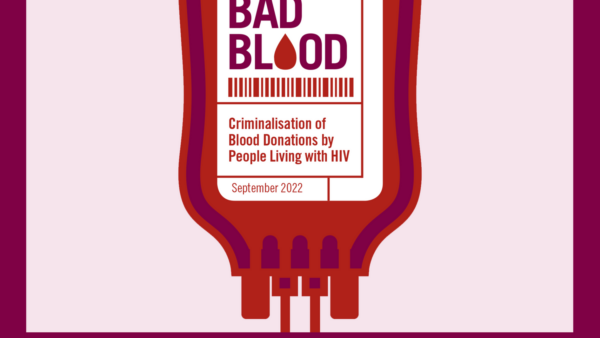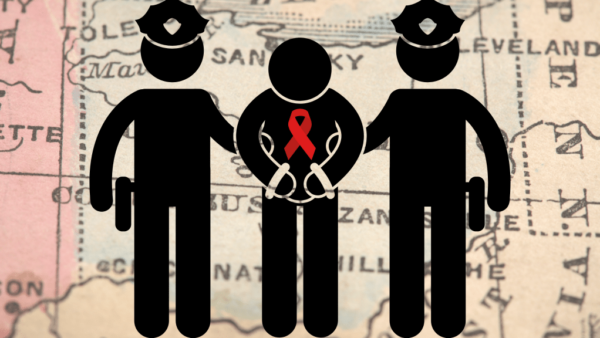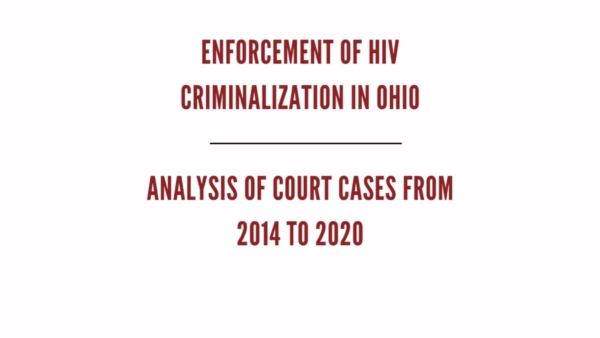Overview
Ohio maintains several HIV-specific provisions criminalising non-disclosure, perceived ‘exposure’, sex work, and blood donations by people living with HIV. The laws cover many types of conduct that carry little to no risk of transmission. Ohio actively enforces these provisions and there have been at least 450 criminal cases in the state.
Ohio criminal law contains a ‘felonious assault’ provision which contains two sections used to criminalise people living with HIV. The first makes it an offence for someone who knows they are living with HIV to engage in sexual conduct without disclosing their status to the other person. Sexual conduct is defined broadly to include penetrative and oral sex, as well as the insertion of objects if they carry the fluids of the person living with HIV. Intent and actual transmission are not required, and the provision makes no reference to the use of condoms, so disclosure is the only defence, except where the sexual partner is someone who ‘lacks the mental capacity to appreciate the significance’ of HIV status, in which case sexual conduct is an offence regardless of disclosure. In at least one case, reported in September 2023, charges of attempted felonious assault have also been laid. Each sexual act can lead to separate criminal charges, such as in a 2019 case in which a man was charged with 11 counts of felonious assault, one for each time he allegedly had sex with a woman without disclosing his status.
The second relevant element of the felonious assault provision is a general provision criminalising the causing of ‘serious physical harm’ including by use of a ‘deadly weapon or dangerous ordnance’. This has been interpreted by the courts to include spitting by people living with HIV, with their saliva considered a ‘deadly weapon’ for these purposes. Cases have often involved the saliva containing, or potentially containing, blood, though prosecutions have also occurred where there appears to be no suggestion of this, such as a case in 2020 involving a man spitting on police officers during an arrest. This is despite there being no risk of transmission from saliva. Similarly, a 2024 case involved a charge under this provision after a man living with HIV was accused of throwing his blood on a nurse.
Both parts of this provision are second-degree felonies punishable by up to eight years’ imprisonment. People convicted under this law can also be subject to intrusive ‘community controls’. For instance, a person convicted in 2006 was upon release required to refrain from sexual contact for five years unless he sought prior court approval, and was subsequently sentenced to a further two years for alleged violation of this order. People convicted of this non-disclosure provision are also required to register as sex offenders for life if they are found to have committed the offence with ‘sexual motivation’.
People living with HIV have also been convicted for involuntary manslaughter for non-disclosure of their status prior to sex. In a 2017 case, a man was sentenced to eight years’ imprisonment for having unprotected sex with a woman without disclosing his status after the woman contracted HIV and subsequently died.
Perceived ‘exposure’ is also an offence and can be prosecuted under several provisions. The first, ‘harassment with a bodily substance’, makes it an offence to ‘expose’ another to bodily fluids with the intent to ‘annoy, threaten, alarm, or harass’. There is no requirement for intent to transmit, or for transmission to occur. This offence carries a penalty of up to 36 months’ imprisonment. The offence explicitly applies to people living with HIV and viral hepatitis; similar conduct is only an offence for others in the context of detention, and with a lower penalty.
Another provision, a ‘spreading contagion’ offence, makes it a second-degree misdemeanour, punishable with up to 90 days’ imprisonment, to fail to take measures to prevent ‘exposure’ to a ‘dangerous, contagious disease’, which has been interpreted to include HIV. Reports suggest that sex workers have frequently been charged with this provision, but it appears not to relate to HIV, and in most cases the contagion charge is dropped.
Another significant aspect of HIV criminalisation in Ohio is through sex work, which is criminalised generally but which provides higher penalties for those living with HIV. The law explicitly prohibits solicitation, ‘loitering to engage in solicitation’, and engaging in ‘sexual activity for hire’. Intention to transmit is irrelevant, as is actual transmission (in fact sexual activity is not required at all for the two soliciting offences). For instance, a case reported in 2024 concerned a woman living with HIV who allegedly ‘exposed’ more than 200 people in several states to a risk of HIV transmission through sex work. There was no suggestion of intent to transmit, and no proven cases of transmission. The maximum penalties for people living with HIV for these offences range from 12 to 36 months’ imprisonment.
People living with HIV are explicitly prevented from donating or selling their blood or plasma for the purposes of transfusion. This is a fourth-degree felony, carrying a maximum penalty of eighteen months’ imprisonment, though the provision appears to be little used (see our report, Bad Blood, for a global analysis of the criminalisation of blood donations).
The law also allows the health records of a person living with HIV to be accessed by law enforcement upon court order to aid in prosecutions, but cannot be disclosed to others without further court authorisation.
This suite of laws is actively enforced in Ohio, and we are aware of more than 50 media reports of prosecutions in the state. However, recent in-depth analyses of prosecution data have revealed that this is a fraction of the total cases in Ohio. The Ohio Health Modernization Movement (OHMM) and the Equality Ohio Education Fund (EOEF) undertook an analysis of prosecutions from 2014-2020 and documented at least 214 HIV cases. The majority of media reports involve charges under the felonious assault provision, usually for non-disclosure prior to sex, however this analysis reveals that more than half of the cases recorded by OHMM/EOEF fall under the ‘harassment with a bodily substance’ provision (56%), with a smaller but significant number of felonious assault cases (36%), a discrepancy which may be attributable to local media deeming non-disclosure cases most ‘newsworthy’. A small number of cases relate to sex work (8%), while there are no reported cases involving blood donation. Although the data suggested an overrepresentation of black people in enforcement data, this is only in comparison to the total black population in Ohio – enforcement data is comparable to the number of black people living with HIV.
A more extensive analysis published in 2024 by the Williams Institute, reviewing the period 2000-2022 corroborated these findings. It found that there had been at least 447 HIV cases involving 530 separate allegations of criminal conduct. Almost half of cases were under the felonious assault provision (48%), while 21% related to ‘harassment with a bodily substance’ and 19% for sex work offences. While this may appear to contradict the OHMM/EOEF findings, the discrepancy is due to the different review period and the legislative history in the state – the felonious assault provision has been in place since 2000, while the harassment offence was only introduced in 2013. The Williams Institute also found six cases of blood donations being enforced. Women were significantly overrepresented in arrests under HIV laws in Ohio.
Advocacy and legal efforts have been ongoing in Ohio to draw attention to the discriminatory and outdated nature of HIV criminalisation laws, and to challenge them in court. OHMM has been working to build a coalition behind reform, and there have been growing calls from health experts and some parts of the media for modernisation. Additionally, several legal challenges to the constitutionality of Ohio’s laws have been lodged, but so far unsuccessful, including a challenge to the non-disclosure provision which reached a conclusion in 2020, with the Supreme Court unanimously rejecting an application that the law violates the right to free speech and equal protection. The Court ruled that the law regulates conduct (the sexual activity) rather than speech (the disclosure), and relates to a legitimate interest in preventing transmission so does not violate either right.
In May 2024, Republican Senator Sara Carruthers introduced two bills aimed at amending Ohio’s HIV criminalisation laws. House Bill 513 would replace the existing ‘exposure’/non-disclosure law with a new provision with stronger safeguards in place. While it would continue to criminalise HIV ‘exposure’/non-disclosure, this law would require the conduct to pose a ‘substantial risk of transmission’, a failure to take precautions against transmission, and crucially, actually cause transmission. The second bill, House Bill 498, would repeal the blood donation criminal provision.
For a detailed analysis of HIV criminalisation in Ohio, as well as all other US states, see the Center for HIV Law and Policy report, HIV Criminalisation in the United States: a Sourcebook on State and Federal HIV Criminal Law and Practice.
Laws
Ohio Code § 2903.11
Felonious Assault
(A) No person shall knowingly do either of the following:
(1) Cause serious physical harm to another or to another’s unborn;
(2) Cause or attempt to cause physical harm to another or to another’s unborn by means of a deadly weapon or dangerous ordnance.
(B) No person, with knowledge that the person has tested positive as a carrier of a virus that causes acquired immunodeficiency syndrome, shall knowingly do any of the following:
(1) Engage in sexual conduct with another person without disclosing that knowledge to the other person prior to engaging in the sexual conduct;
(2) Engage in sexual conduct with a person whom the offender knows or has reasonable cause to believe lacks the mental capacity to appreciate the significance of the knowledge that the offender has tested positive as a carrier of a virus that causes acquired immunodeficiency syndrome;
(3) Engage in sexual conduct with a person under eighteen years of age who is not the spouse of the offender.
(C) The prosecution of a person under this section does not preclude prosecution of that person under section 2907.02 of the Revised Code.
(D)(1)(a) Whoever violates this section is guilty of felonious assault. Except as otherwise provided in this division or division (D)(1)(b) of this section, felonious assault is a felony of the second degree. If the victim of a violation of division (A) of this section is a peace officer or an investigator of the bureau of criminal identification and investigation, felonious assault is a felony of the first degree.
Ohio Code § 2907.24
Soliciting; Solicitation After a Positive HIV Test
(A) No person shall knowingly solicit another to engage in sexual activity for hire in exchange for the person receiving anything of value from the other person.
(B) No person, with knowledge that the person has tested positive as a carrier of a virus that causes acquired immunodeficiency syndrome, shall engage in conduct in violation of division (A) of this section.
(C)
(1) Whoever violates division (A) of this section is guilty of soliciting. Soliciting is a misdemeanor of the third degree.
(2) Whoever violates division (B) of this section is guilty of engaging in solicitation after a positive HIV test. If the offender commits the violation prior to July 1, 1996, engaging in solicitation after a positive HIV test is a felony of the second degree. If the offender commits the violation on or after July 1, 1996, engaging in solicitation after a positive HIV test is a felony of the third degree.
(D) As used in this section, “sexual activity for hire” means an implicit or explicit agreement to provide sexual activity in exchange for anything of value paid to the person engaging in such sexual activity, to any person trafficking that person, or to any person associated with either such person.
Ohio Code § 2907.25
Prostitution – After Positive HIV Test
(A) No person shall engage in sexual activity for hire.
(B) No person, with knowledge that the person has tested positive as a carrier of a virus that causes acquired immunodeficiency syndrome, shall engage in sexual activity for hire.
(C)
(1) Whoever violates division (A) of this section is guilty of prostitution, a misdemeanor of the third degree.
(2) Whoever violates division (B) of this section is guilty of engaging in prostitution after a positive HIV test. If the offender commits the violation prior to July 1, 1996, engaging in prostitution after a positive HIV test is a felony of the second degree. If the offender commits the violation on or after July 1, 1996, engaging in prostitution after a positive HIV test is a felony of the third degree.
Ohio Code § 2907.241
Loitering to Engage in Solicitation – Solicitation After Positive HIV Test
(A) No person, with purpose to solicit another to engage in sexual activity for hire and while in or near a public place, shall do any of the following:
(1) Beckon to, stop, or attempt to stop another;
(2) Engage or attempt to engage another in conversation;
(3) Stop or attempt to stop the operator of a vehicle or approach a stationary vehicle;
(4) If the offender is the operator of or a passenger in a vehicle, stop, attempt to stop, beckon to, attempt to beckon to, or entice another to approach or enter the vehicle of which the offender is the operator or in which the offender is the passenger;
(5) Interfere with the free passage of another.
(B) No person, with knowledge that the person has tested positive as a carrier of a virus that causes acquired immunodeficiency syndrome, shall engage in conduct in violation of division (A) of this section.
(…)
(D)
(1) Whoever violates division (A) of this section is guilty of loitering to engage in solicitation, a misdemeanor of the third degree.
(2) Whoever violates division (B) of this section is guilty of loitering to engage in solicitation after a positive HIV test. If the offender commits the violation prior to July 1, 1996, loitering to engage in solicitation after a positive HIV test is a felony of the fourth degree. If the offender commits the violation on or after July 1, 1996, loitering to engage in solicitation after a positive HIV test is a felony of the fifth degree.
Ohio Code § 2921.38
Harassment with a Bodily Substance
(A) No person who is confined in a detention facility, with intent to harass, annoy, threaten, or alarm another person, shall cause or attempt to cause the other person to come into contact with blood, semen, urine, feces, or another bodily substance by throwing the bodily substance at the other person, by expelling the bodily substance upon the other person, or in any other manner.
(B) No person, with intent to harass, annoy, threaten, or alarm a law enforcement officer, shall cause or attempt to cause the law enforcement officer to come into contact with blood, semen, urine, feces, or another bodily substance by throwing the bodily substance at the law enforcement officer, by expelling the bodily substance upon the law enforcement officer, or in any other manner.
(C) No person, with knowledge that the person is a carrier of the virus that causes acquired immunodeficiency syndrome, is a carrier of a hepatitis virus, or is infected with tuberculosis and with intent to harass, annoy, threaten, or alarm another person, shall cause or attempt to cause the other person to come into contact with blood, semen, urine, feces, or another bodily substance by throwing the bodily substance at the other person, by expelling the bodily substance upon the other person, or in any other manner.
(D) Whoever violates this section is guilty of harassment with a bodily substance. A violation of division (A) or (B) of this section is a felony of the fifth degree. A violation of division (C) of this section is a felony of the third degree.
[…]
Ohio Code § 2927.13
Selling or Donating Contaminated Blood
(A) No person, with knowledge that the person is a carrier of a virus that causes acquired immune deficiency syndrome, shall sell or donate the person’s blood, plasma, or a product of the person’s blood, if the person knows or should know the blood, plasma, or product of the person’s blood is being accepted for the purpose of transfusion to another individual.
(B) Whoever violates this section is guilty of selling or donating contaminated blood, a felony of the fourth degree.
Ohio Code § 3701.81
Exposing Others to Contagion
(A) No person, knowing or having reasonable cause to believe that he is suffering from a dangerous, contagious disease, shall knowingly fail to take reasonable measures to prevent exposing himself to other persons, except when seeking medical aid.
(B) No person, having charge or care of a person whom he knows or has reasonable cause to believe is suffering from a dangerous, contagious disease, shall recklessly fail to take reasonable measures to protect others from exposure to the contagion, and to inform health authorities of the existence of the contagion.
(C) No person, having charge of a public conveyance or place of public accommodation, amusement, resort, or trade, and knowing or having reasonable cause to believe that persons using such conveyance or place have been or are being exposed to a dangerous, contagious disease, shall negligently fail to take reasonable measures to protect the public from exposure to the contagion, and to inform health authorities of the existence of the contagion.
Ohio Code § 2903.04
Involuntary manslaughter
(A) No person shall cause the death of another or the unlawful termination of another’s pregnancy as a proximate result of the offender’s committing or attempting to commit a felony.
(B) No person shall cause the death of another or the unlawful termination of another’s pregnancy as a proximate result of the offender’s committing or attempting to commit a misdemeanor of any degree, a regulatory offense, or a minor misdemeanor other than a violation of any section contained in Title XLV of the Revised Code that is a minor misdemeanor and other than a violation of an ordinance of a municipal corporation that, regardless of the penalty set by ordinance for the violation, is substantially equivalent to any section contained in Title XLV of the Revised Code that is a minor misdemeanor.
(C) Whoever violates this section is guilty of involuntary manslaughter. Violation of division (A) of this section is a felony of the first degree. Violation of division (B) of this section is a felony of the third degree.
Further resources
Not all laws used to prosecute people living with HIV in this state are included on this page. For a comprehensive overview and analysis of HIV-related criminal and similar laws and policies, visit The Center for HIV Law and Policy










